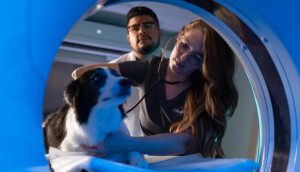What are meningitis and encephalitis?
Meningitis and encephalitis both describe inflammation that occurs in the brains of dogs and cats.
You may hear about meningitis in the news, but it’s used a bit differently in the veterinary world. Meningitis in humans often refers to an infectious condition that is highly transmissible between people. For pets, the word meningitis (or encephalitis) just means there is inflammation in or around the brain.
Typically, this is not transmissible in dogs and cats. However, in rare cases, it could spread to another animal or, very rarely, a human.
“Meningitis” is the term for inflammation of the lining of the brain or spinal cord. This stems from the word meninges, which is the name for the lining of the brain or spinal cord.
“Encephalitis” is the term for inflammation of the brain tissue itself. If the spinal cord is involved, you may also hear the word “myelitis” being used. In some cases, the words are strung together to include all tissues involved, such as meningoencephalitis or meningoencephalomyelitis.
Clinical signs and symptoms of inflammatory diseases
With neurological problems, the clinical signs or symptoms are related to the location within the brain rather than the type of disease. This is why there is a lot of overlap in symptoms between various brain diseases.
The most common clinical signs associated with meningitis are:
- Fever
- Neck pain or stiffness (may show as hesitation to move the head or reluctance to eat or drink due to the posture necessary to reach food and water bowls)
- Reduced activity
- General discomfort
The signs of encephalitis typically also include the signs of meningitis, but with the possible addition of:
- Behavior changes
- Confusion
- Agitation
- Seizures
In some cases, signs can also include balance issues like:
- Vertigo
- Lack of coordination
- Weakness
- Tremors
All in all, the symptoms of these diseases vary, and a patient may experience any combination of them. These signs may also be present with other neurological diseases.
Causes
Meningitis and encephalitis can be caused either by infections or by an autoimmune process. Autoimmune processes can occur when the body’s immune system gets confused and no longer recognizes the brain tissue as part of the body, and so it mistakenly tries to attack and fight this “foreign” tissue.
So how does the immune system get confused? In many cases, the reason is unknown, but it is thought that the body was initially (and appropriately) fighting off an abnormal cell or organism, and one little part of that abnormal cell or organism looked similar to the nervous system, which then caused the immune system to become confused and start fighting the nervous system instead.
There are many types of infections that can affect the nervous system. There are too many to list specifically, and they depend heavily on geographic region. However, the most common categories of organisms include:
- Viruses
- Bacteria
- Fungal organisms
- Protozoal organisms
In rare cases, other types of infections can occur.
Getting a diagnosis
Because the nervous system is so hidden away from view, and because the clinical signs overlap considerably between inflammatory and infectious diseases, strokes, tumors and metabolic processes, a series of tests are often needed to screen for the various causes. The order in which the tests are done is important to ensure patient safety.
 MRI (magnetic resonance imaging)
MRI (magnetic resonance imaging)
An MRI scan allows your veterinarian to see the tissues of the brain in great detail and takes about an hour to perform. During that time, your vet will use different settings to highlight various characteristics of the brain tissue. Some settings are better for showing tissue while others show fluid, inflammation, hemorrhage or ischemia (e.g., strokes).
These images are captured again after the patient is given an intravenous contrast agent. Contrast agents show up bright white on the MRI scan and are used to highlight tumors and inflammation.
What does an MRI reveal?
An MRI can help determine which parts of the brain are affected and how much swelling is present in response to the inflammation. Since many neurological diseases can show the same symptoms, this also confirms if the problem is inflammation or infection rather than a stroke or tumor.
Spinal fluid analysis (spinal tap, CSF tap)
Inflammatory or infectious diseases are typically diagnosed by testing spinal fluid. Patients with meningitis or encephalitis have increased numbers of white blood cells or protein concentrations in their spinal fluid. A spinal tap procedure is used to obtain a sample of spinal fluid for this evaluation.
Despite a spinal tap being the most important for a diagnosis, an MRI is performed first in most cases because it can help determine if a spinal tap is safe to perform. If significant brain swelling is present, this can cause pressure in the brain, and performing a spinal tap when there’s increased pressure in the brain can be very dangerous and potentially even fatal.
Blood or urine screening
If inflammation is present, the next step is to try to identify its source.
Inflammation can be caused by infections or by autoimmune processes. There is currently no reliable test to screen for or confirm an autoimmune process other than a brain biopsy, so various infections are typically screened for instead. If those are negative, then the cause must be an autoimmune process.
The specific tests that are recommended likely depend on your geographic region, your pet’s vaccination status and any travel history, so be sure to share any places your pet may have traveled to in the 6 months prior to the onset of signs.
Also be sure to mention any recent infections of other areas of the body (e.g., skin infections, ear infections, urinary tract infections, respiratory infections, etc.) and share your pet’s full vaccination history. This information will be very helpful to your pet’s care team in providing the most accurate screening plan for your pet.
Brain biopsy
A brain biopsy is sometimes used to confirm the diagnosis of an autoimmune process such as encephalitis. This is not typical, as autoimmune processes are more commonly diagnosed by testing for various infections and receiving negative results. However, in some cases, a brain biopsy can be helpful.
Minimally invasive biopsies use different techniques to guide needle placement:
- Anatomic landmarks such as the appearance of skull shape
- Image guidance like a CT or MRI scan
- A neuronavigation system such as a stereotactic navigation computer system
With needle biopsies, a small burr hole is made in the skull to allow the needle to pass, using a surgical drill similar to a Dremel drill, and a small sample of cells is drawn into the needle and submitted for analysis.
Questions for your doctor
 When consulting with your pet’s veterinarian, consider asking questions like:
When consulting with your pet’s veterinarian, consider asking questions like:
- What are the treatment options, risks and estimated costs for each medication option?
- What are the predicted outcomes for this type of infection or autoimmune disease?
- How likely are relapses to occur?
- Is there any risk of this disease being transmitted to other pets or humans in the household?
Treatment
Treatment for meningitis and encephalitis is dependent on whether it is caused by an infection or an autoimmune process.
Infections
Treatment for infections may involve:
- Antibiotics
- Anti-fungal medications
- Anti-protozoal medications
For infections of the nervous system, treatment is often continued for several months at a minimum. In some cases, treatment may be lifelong.
The duration of treatment is based on:
- Which organism was diagnosed
- How well the pet responds to medication
- If any relapses occur during or after the course of treatment
There are some infections for which no treatment exists.
Autoimmune processes
Treatment for autoimmune processes involves long-term medications to suppress the immune system until it can “reset” and no longer attempts to attack the nervous system.
There are many medications available, from daily medications administered at home to periodic injections administered every 3-6 weeks.
Often, combinations of two or more medications may be used. The specific medication selected for your pet will depend on:
- Any concurrent health conditions
- Possible interactions with other medications your pet is taking
- Your pet’s stress level associated with frequent veterinary visits
- Budgetary constraints associated with treatment or monitoring
- Logistical/schedule limitations
Prevention
Currently, there are no known methods for preventing most forms of meningitis or encephalitis. It is, however, possible to prevent or minimize the risk of viral meningitis or encephalitis by ensuring your pet receives their core vaccines (e.g., distemper, rabies, etc.) and avoiding contact with other animals of unknown vaccine status.
Tick-borne disease infections may be avoided by maintaining active flea and tick prevention.
While maintaining current vaccination status is important to protect your pet, if an autoimmune disorder is identified, alterations to the vaccine schedules may be recommended to avoid overstimulation of the immune system and minimize relapses.
Prognosis
The prognosis for meningitis and encephalitis varies widely depending on the type of infection or autoimmune disease present.
Because meningitis and encephalitis are not “one” disease, but rather a group of many diseases that have similar characteristics but different outcomes, it’s very difficult to predict the long-term outcomes.
For those diseases that are deemed “treatable,” many patients do very well, some may do well but with intermittent relapses, and a subset may not respond to treatment at all.
Many BluePearl Pet Hospitals offer advanced diagnostic equipment and specialty veterinary services including neurology. Find a BluePearl neurologist near you.


